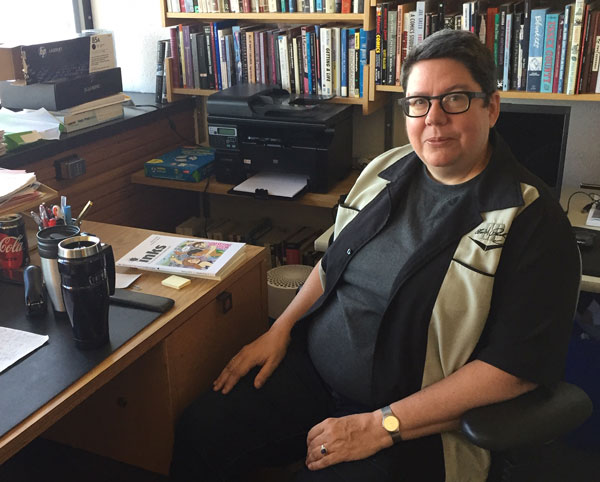
English and Film Studies professor Julie Rak awarded the 2019 Henry Marshall Tory Chair
For as long as she can remember,Julie Rak has been interested in stories, particularly those that fall outside conventional literary scrutiny. Memoir, life-writing, online writing, diary - historically marginalized categories of writing that often present a diversity of voice lacking in more dominant literary genres.
Bringing these overlooked voices to the table is at the core of Rak's scholarly work.
"Stories are part of our architecture," says the English and Film Studies professor. "I'm really fascinated by what so-called ordinary people do, read, watch and produce creatively about their lives. The mass of humans who live and die on this earth all have stories, and yet we often just focus on a very few or very narrow ideas about what these stories are."
Earlier this month, Rak was awarded the 2019 Henry Marshall Tory Chair. Named after the first president of the University of Alberta, the five-year renewable appointment recognizes Rak's outstanding record of scholarly research, teaching and educational leadership over two decades, as well as her service to the University of Alberta and community.
This prestigious recognition comes on the heels of theKillam Annual Professorship, which she received in 2017 for "championing the cause of the counter narrative". At the time, Rak was only the fifth woman in the Faculty of Arts to win the prestigious award. A year later, she was recognized for her graduate supervision with the Great Supervisor Award from the Faculty of Graduate Studies and Research.
As Cecily Devereux, Chair of the Department of English and Film Studies, notes: "Julie has shown that she understands university to be a place of expansive and diverse inclusivity not for a privileged few, but for the whole people."
In addition to her work as an educator and writer (she recently co-edited the groundbreaking Refuse: CanLit in Ruins), one of Rak's ongoing research projects involves the challenges Inuit writers face in telling their stories. In 2015, along with colleague Keavy Martin, Rak edited a reissued edition ofLife Among the Qallunaat by Inuit author Mini Aodla Freeman. When it was originally published in 1978, almost the entire print run of 3,000 copies disappeared. Decades later, Freeman's books were discovered in the basement of a federal government office along with other Inuit titles, stored there for reasons that are still unclear.
Prompting further investigation, in 2017 Rak was awarded a three-year SSHRC Insight Grant entitled, "Government Agents, Literary Agents (GALA): Inuit Books and Government Intervention, 1968-1985". As Principle Investigator, Rak intends to use a portion of the funds awarded to her as a Tory Chair to bring the project to completion, particularly in terms of supporting Inuit student researchers and an Inuk consultant who fall beyond the original funding parameters of the project.
"We're at the information gathering stage, and it's turning out to be a really complex, complicated story," says Rak. "We have to work out how to do this in a good way because it could be potentially very traumatic for people. These funds can help support community consultation work so that those who were affected can say how knowledge about the program should be made public."
"Julie shows all of us that it is possible to be a prolific and highly recognized scholar while also being a good citizen too," says Keavy Martin, co-applicant of the research project.
Additionally, over the next five years Rak will investigate how the field of life writing - writing about yourself, and biography - writing about other people, can be grown and developed. Included in this is an emerging field which she calls auto media, or online life writing. This will be facilitated, in part, by organizing "digital coffees" with scholars from coast to coast who share similar interests. To connect the digital coffee network to developments in international scholarship, Rak will sponsor a Round the World virtual symposium on life writing pedagogy and research, which will be held in conjunction with the Faculty of Arts newSignature Area of Research and Creative Collaboration called Stories of Change, which Rak is helping to develop.

Bringing overlooked voices to the table is at the core of Julie Rak's scholarly work (PHOTO: Danielle Fuller)
At times in her life, Rak has been one of the marginalized voices she now studies. Acknowledging her privilege as an "educated, white woman", she has nevertheless encountered an "enormous" amount of prejudice because she is a lesbian - something that she wanted to highlight in her Tory Chair application because it is a position rarely occupied by a minority.
"One of the things I want to do as a senior scholar is to open the door for anyone to come in - and keep the door open. I think that should be part of my job," she says.
Rak and her family immigrated to Canada at the age of 13 after her father, who was a professor, got a job in Toronto. After spending her early years in Delmar, New York - a small town with one traffic light, Toronto was a culture shock.
"Because I'm white and I speak English, I looked like I fit in, but I often made mistakes," she explains. Rak became interested in Canadian literature because she wanted to know more about the country she now called home. "I read Alice Munro anthropologically. She wrote about Ontario and I was like, Oh! You understand these strange people!"
Eventually, Rak relinquished her American citizenship so that she could join the Canadian army, where she played the clarinet. "I like to say the clarinet is a deadly weapon,'' she laughs, adding that she has no intention of regaining her US citizenship.
"My future lies with this country and all of its possibilities and also all of its tragedy. This is where I need to be to be part of building a better world."